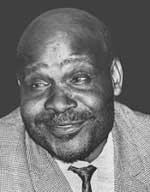This Day in History: October 22, 1922
Additional Date: October 22, 1922
Thomas Titus Nkobi was born in Southern Rhodesia (now Zimbabwe) in Southern Matabeleland. At the age of ten, Nkobi followed his father who was a migrant labourer in the South African mines to South Africa. In 1941 he went to Adams College in Natal and continued to complete his high School education by matriculating from Bantu High School (later Madibane High School) in Western Township, Johannesburg in 1946. Nkobi went to further his education at Roma College (now National University of Lesotho) in Lesotho where he studied for a Bachelor of Commerce degree. He then joined the African National Congress (ANC) in the early 1950s becoming involved in its activities. For instance, he was extensively involved in the Alexander Bus Boycotts in 1944 and after joining the ANC.
In 1955 he participated in the Congress of the People and attended the assembly that formulated the Freedom Charter as a delegate from Alexandra. Two later he was arrested for taking part in the Potato boycott which was organized to expose the plight of black political detainees forced to work in private farms. Nkobi became the ANC National Organizing Secretary in 1958 and travelled across the country organizing members into Mandela's M-Plan, an underground network of street committee based cell units of the ANC. His trip to the Free State undertaken during state of emergency declared after the Sharpeville Massacre resulted in arrest by the security police. He was detained and tortured by the security police and later he was transferred to a police station where he was held in communicado.
After spending days in detention he was taken to court and charged with illegally distributing leaflets. In 1961 he was banned and placed under 24 hour house arrest the following year. Nkobi skipped the country and went to exile in April 1963 fleeing to Dar es Salaam in Tanzania and moved to Lusaka in Zambia in 1964. Once in exile he continued to galvanize international public opinion against the apartheid government serving as the ANC's Chief Representative until 1968. In 1972 Nkobi became the Deputy Treasurer of the ANC after Moses Kotane fell ill and became the Treasurer General in 1977. After the fall of apartheid Nkobi returned to South Africa. He was elected as a Member of Parliament and served as a member of the ANC National Executive Committee (NEC) and member of the ANC's National Working Committee (NWC) until his death in September 1994.
In 2004, Thomas Nkobi posthumously awarded the Order of Luthuli in Gold for his role in the struggle against apartheid. The Ekurhuleni Metropolitan Municipality also renamed South Park Cemetery in Boksburg as the Thomas Titus Nkobi Memorial Park.
